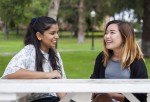A project that aims to showcase the perspectives of international students will be launching at UCLA during the middle of fall quarter.
Second Impressions, which began at Duke University and spread to UC Berkeley, shares international students’ stories on a Facebook page. Each story features a picture of an international student and a personal narrative from the student.
The UC Berkeley team is aiming to spread the project to other University of California campuses, said Pallavi Samodia, a co-director of Second Impressions at UCLA. At UCLA, the project is part of the undergraduate student government’s general representative 2’s office.
Samodia says she thinks the project will help people to look beyond their first impressions of international students.
“(People) might not speak the same language or be able to relate at all to (international students),” Samodia said. “But the grief of losing one’s family and friends, or one’s homeland, is insufferable in every language.”
The UCLA team will include editors, photographers and interviewers who will be mentored by the founding members of the UC Berkeley team, Samodia said.
The project also aims to help international students feel welcome on campus and inspired by stories of other students like themselves, Samodia added.
“At a time when the country is divided on lines of faith or origin, it is important, at least for the students who are torch holders of the future, to realize that at the end of the day, human nature is constant throughout the globe,” Samodia said.
Samodia said she thinks international students often feel alone or hindered because they do not fully understand American culture and feel that domestic students do not understand them.
“For many (international students), UCLA is the only family they have in (the United) States,” Samodia said. “The decision to leave their homelands and make their place in a foreign land is a big one, and frightening one as well.”
Ramya Rupanagudi, co-director of Second Impressions at Berkeley, the UC Berkeley branch, said the project, which launched as a Facebook page in January 2016, has garnered more than 2000 likes, with some of its most popular posts garnering 1200 likes.
“(Second Impressions at Berkeley) has given international students a platform to speak out,” Rupanagudi said. “Many students have used it as an opportunity to educate others about their home country.”
Rupanagudi said the stories have included topics such as mental health, academic difficulties, cultural exchange and gender identity.
The program has also helped American students on campus learn more about their international peers, Rupanagudi added.
Jessie Hwang, former administrator of Second Impressions UC Berkeley, said each post starts with project members, who are international students, reaching out to students they know. An interviewer and photographer would then meet the interviewee to ask them questions about their background and hometown culture, she added.
“The editor would produce the final article to be published, and the administrator is responsible for social media campaigns and publishing the photos and articles,” Hwang said.
Hwang added she thinks Second Impressions has helped UC Berkeley students understand international students’ struggles and thoughts better.
“Berkeley is already a liberal campus that champions equality and open-mindedness,” she said. “But (Second Impressions) gave a group of students that traditionally do not seek out opportunities to speak a chance to share their experiences.”
Second Impressions at UCLA will begin recruiting at the beginning of fall quarter.

This is a WONDERFUL program because simply being an international student away from home is difficult, on top of our already complex culture and language. Welcoming and assimilation assistance must come from numerous sources to aid these young people embarking on life’s journey. Most struggle in their efforts and need guidance from schools’ international departments, immigration protection, host families, concerned neighbors and fellow students, and even informative books to extend a cultural helping hand so we all have a win-win situation.
Something that might help anyone coming to the US is the award-winning worldwide book/ebook “What Foreigners Need To Know About America From A To Z: How to Understand Crazy American Culture, People, Government, Business, Language and More.” Used in foreign Fulbright student programs and endorsed worldwide by ambassadors, educators, and editors, it identifies how “foreigners” have become successful in the US and how they’ve contributed to our society, including students.
A chapter on education explains how to cope with a confusing new culture, friendship process and daunting classroom differences. It has chapters that explain how US businesses operate and how to get a job (which differs from most countries), a must for those who want to work with/for an American firm here or overseas.
It also identifies the most common English grammar and speech problems foreigners have and tips for easily overcoming them, the number one stumbling block they say they have to succeeding here.
Good luck to all at UCLA or wherever you study or wherever you come from, because that is the TRUE spirit of the American PEOPLE, not a few in government who have the loudest voice!